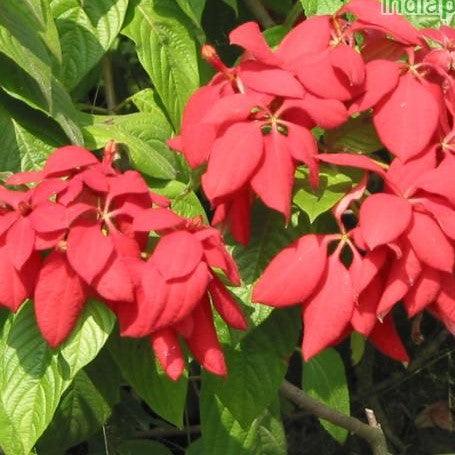-
Plant Description:
- -
Mussaenda is a genus of tropical shrubs and small trees in the Rubiaceae family. The flowers of some species are quite showy, with large bracts surrounding the small, white or yellow flowers. The bracts can be red, orange, pink, or yellow, which can add a lot of color to a garden.
Mussaenda hybrids are cultivars developed by crossing different species of Mussaenda. The hybrid cultivar you mentioned, "Mussaenda hybrid red," likely has red bracts surrounding the flowers.
In terms of care, Mussaendas prefer warm temperatures and plenty of moisture. They are well suited for growing in greenhouses or as houseplants, and can also be grown outside in tropical or subtropical climates. They should be grown in well-draining soil that is kept consistently moist, but not waterlogged. They prefer partial to full sunlight, but should be protected from direct hot sun that could cause leaf scorch.
It's important to note that Mussaendas can grow large and woody, and are best pruned regularly to maintain a compact and bushy shape.
As with any plant, it's a good idea to consult a reputable source such as a local nursery or horticulturist if you have specific questions about growing conditions or care.
-
Growing tips:
- -
Here are some general guidelines for caring for a Mussaenda hybrid red plant:
-
Light: Mussaendas prefer partial to full sunlight, but should be protected from direct hot sun that could cause leaf scorch. If grown as indoor plants, place them near a window that receives bright, indirect light.
-
Water: Keep the soil consistently moist but not waterlogged. Be sure to provide proper drainage so the roots do not sit in water. In the growing season, you may need to water the plant more frequently.
-
Temperature: Mussaendas prefer warm temperatures and do not tolerate cold temperatures well. They should be kept in an area with temperatures above 60°F (15°C).
-
Fertilizer: Mussaendas benefit from regular fertilization. You can use a balanced, water-soluble fertilizer or a slow-release fertilizer. Apply the fertilizer according to the package instructions.
-
Pruning: Prune regularly to maintain a compact and bushy shape. Prune the plant in the spring or summer, before the new growth starts.
-
Pest and Diseases: Mussaendas can be susceptible to insect infestations and diseases such as powdery mildew and root rot. Keep an eye out for any signs of insect infestation or disease, such as wilted leaves or spots on the leaves, and take appropriate action.
It's also important to pay attention to the specific needs of your plant, and make adjustments as necessary. If you notice that your plant is not thriving, it may be a sign that it is not getting the right amount of light, water, or nutrients.
It is important to note that Mussaenda are heavy feeders and require regular fertilizing, but also can be sensitive to over-fertilizing. Also regular pruning is important for the healthy growth and flower production.
-
Benefits:
- -
Mussaenda is a genus of evergreen shrubs and small trees in the family Rubiaceae, which is native to tropical Asia and Africa. The Mussaenda hybrids that are commonly cultivated as ornamental plants in gardens and landscapes are known for their brightly colored bracts, which are the modified leaves that surround the small, white, insignificant flowers. The cultivar you are asking about, Mussaenda hybrid red, is likely a hybrid of one of the species in this genus.
Some benefits of growing Mussaenda plants include:
-
Bright and showy flowers: The large, brightly colored bracts of Mussaenda plants are a striking feature and add a vibrant pop of color to the garden.
-
Low maintenance: Mussaendas are relatively easy to grow and maintain, and they can tolerate a wide range of growing conditions. They are also drought-tolerant once established.
-
Attracting pollinators: The flowers of Mussaenda are known to attract bees, butterflies, and other pollinators to the garden, which is beneficial for overall ecosystem health.
-
Versatility: Mussaendas are suitable for growing in a variety of settings, including as container plants, in borders, or as hedges.
-
Tropical feel: Mussaendas have a tropical feel to them, and they can bring a touch of the tropics to gardens even in areas where the climate may not be suitable for truly tropical plants.
It's best to grow in full sun or partial shade, and well-drained moist soil. As with most plants, regular watering and fertilizing will help promote healthy growth, and pruning can be used to control the size and shape of the plant.
Mussaendas are generally hardy in tropical climates, but they can be grown as annuals in cooler climates. It's important to note that many Mussaendas are not cold hardy, so you should protect them from frost if you live in an area with cold winters.


